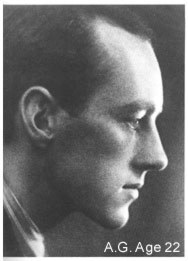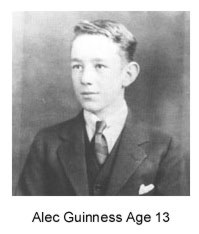
Contents (To
find everything on site) | Biography | Links | Films | Theatre | Awards | Quotes
| " Blessings" |Entry | Remembered | Ealing Studios | Smiley | The Lean Films |
Biography
|
Alec Guinness died 8/5/00 8/11/00 - From the BBC News: A private funeral has been held for acting giant Sir Alec Guinness who died last Sunday. Screen veteran Sir John Mills and actor Keith Baxter were among the small group of mourners at St Lawrence's Roman Catholic Church, Petersfield, Hampshire. A spokeswoman said afterwards: "Sir Alec's funeral was a very low key and private affair, for family and very close friends only, and at his request there will be no memorial service." Sir Alec died aged 86 at King Edward VII Hospital in Midhurst, West Sussex, after battling a long illness. The screen legend was buried at an undisclosed location after the service on Friday. He left a wife of 62 years,playwright Merula Salaman, and son Matthew. The spokeswoman said the family were touched by the public's sympathy but had asked that their privacy be respected. |
|
Bio info from the Encyclopedia Britannica |
|
My birth certificate
registers me as Alec Guinness de Cuffe, born in Marylebone, London,
and April 1914. My mother at the time was a Miss Agnes Cuffe; my father's
name is left an intriguing, speculative blank. When I was five years
old my mother married an army Captain, a Scot named David Stiven,
and from then until I left my preparatory school I was known as Alec
Stiven (a name I rather liked, although I hated and dreaded my stepfather).
At fourteen I was told, quite casually, that my real name was Guinness
and that de Cuffe and Stiven were obliterated. So it was as a very
small Alec Stiven, shortly after the start of my mother's violently
unhappy marriage, which only lasted three years, that I entered yet
another new 'home' - a very depressing three-roomed flat at the top
of a gloomy house in St-John's Wood. In the middle of the night, shortly after we had moved in, I woke and called out, 'There's a man in my room!' And indeed there was; it was Captain Stiven, crouched on the floor, fumbling in the bottom drawer of a creaky wardrobe, which was usually locked, for his service revolver. The bullets were kept in a small, soft leather bag slung over a door-handle. 'It's only me,'he whispered, and crept out of the room in his striped pyjamas, fully armed and ready for action. For once his voice was reassuring and as there were no further sounds I fell asleep again. In the morning I overheard my mother talking in a low voice to the caretaker's wife, who had come up to do a little dusting. 'The Captain,' my mother was saying, in a tone which might have implied Field-Marshal, 'heard someone up here in the night and I thought I saw someone standing at the foot of the bed. Whoever or whatever it was slipped downstairs quickly when the Captain said, "Where's my gun!" He always has his gun with him, in case the Sinn Fein come after him.''Ah!' said the other voice. My mother went on, 'It disturbed the boy. But I think he thought it was a dream. But it wasn't a dream. This house is haunted. We may have to leave.' Later in the day I said, 'What's haunted mean?' 'Ask no questions and you'll hear no tales. It means silliness.' I wasn't satisfied, but left it at that. The following afternoon,
the Captain not at home, my mother, looking fetching in a cloche hat,
told me she was going out 'for just a few minutes.' I grew accustomed,
later on, to interpreting just a few minutes) as two or three hours.
'You stay in here and draw me a nice picture. I'll be back before
you've even started.'I settled down happily in the sitting-room and
drew a huge fleet of dreadnoughts. As smoke and shells bulged out
of every gun I provided an appropriate 'boom'; until it struck me
that it was getting dusky, I needed lights, and the house was exceptionally
quiet. Could I hear breathing somewhere! I began to panic.'This house
is haunted.' I still didn't know what that could possibly mean but
I felt something unpleasant was beginning to happen. I went on to
the landing and peered down the well of the stone staircase, wondering
if I could get safely to the basement and the indifferent comfort
of the caretaker's. Not a sound anywhere. I tiptoed down the first
flight of stairs, holding my breath as much as I could, and waited
by the black door of the next: flat to see if it moved. Nothing. I
took the next flight at greater speed, |
 b.
April 2, 1914, London, Eng. British actor famous for the variety and
excellence of his stage and screen characterizations. Throughout his
school days Guinness amused his classmates by acting out stories he
had invented at the age of seven while ill. He was first a copywriter
for an advertising agency, then, after studying acting, made his stage
debut in 1934 as an extra at the King's Theatre, Hammersmith, London.
Three years later he joined the acting company of
b.
April 2, 1914, London, Eng. British actor famous for the variety and
excellence of his stage and screen characterizations. Throughout his
school days Guinness amused his classmates by acting out stories he
had invented at the age of seven while ill. He was first a copywriter
for an advertising agency, then, after studying acting, made his stage
debut in 1934 as an extra at the King's Theatre, Hammersmith, London.
Three years later he joined the acting company of  Many
actors, when they have made a name for themselves, are endlessly recounting
in the public prints how they don't know who they are, why they are,
or, indeed, where they are. Poor, rich, exceptionally brilliant Peter
Sellers never seemed to get himself sorted out in spite of the fact
that, apart from some upset marriages, there didn't appear to be much
confusion in his life. I, on the other hand, was born to confusion
and totally immersed in it for several years, owning three different
names until the age of fourteen and living in about thirty different
hotels, lodgings and flats, each of which was hailed as 'home' until
such time as my mother and I flitted, leaving behind, like a paper-chase,
a wake of unpaid bills.
Many
actors, when they have made a name for themselves, are endlessly recounting
in the public prints how they don't know who they are, why they are,
or, indeed, where they are. Poor, rich, exceptionally brilliant Peter
Sellers never seemed to get himself sorted out in spite of the fact
that, apart from some upset marriages, there didn't appear to be much
confusion in his life. I, on the other hand, was born to confusion
and totally immersed in it for several years, owning three different
names until the age of fourteen and living in about thirty different
hotels, lodgings and flats, each of which was hailed as 'home' until
such time as my mother and I flitted, leaving behind, like a paper-chase,
a wake of unpaid bills.